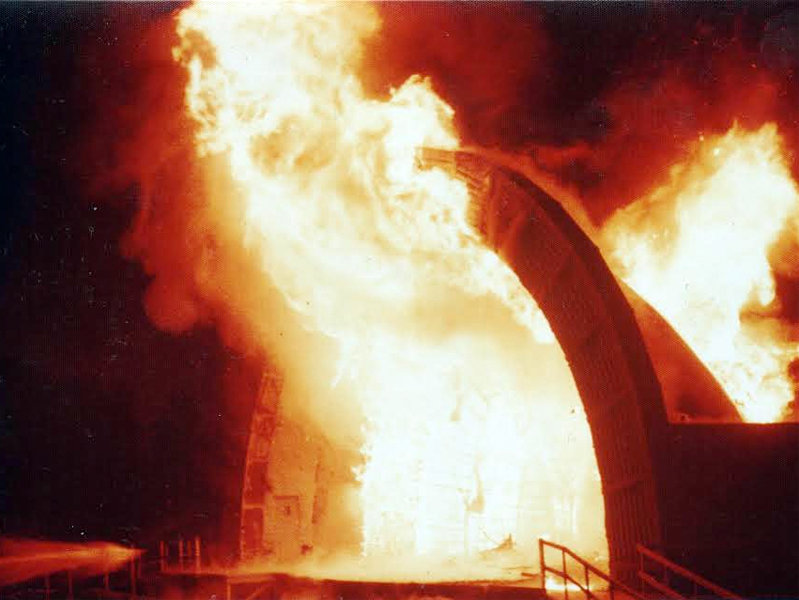When he was the richest and most influential African-American in Milwaukee, John L. Slaughter was known as "Long John" because he was six-and-a-half feet tall, as well as "Honest John" because, as owner of one of Downtown’s biggest gambling joints, it was said he never "dealt from the bottom of the deck."
He was also no stranger to the police blotter since even aboveboard gambling was officially illegal when Slaughter reigned, in the long-ago words of a local newspaper, as "king of the Milwaukee colored colony." And his fall from the throne was as jaw-dropping as his rise.
Slaughter came here in the 1880s and worked as a Pullman porter until he sold a watch for $10 and parlayed that into $200 at a local gambling house. It may have been one at 207 W. Water St. (now North Plankinton Avenue) run by a black man named – so help me God – Scott Walker, who according to Slaughter "came as near being a gentleman as any man I ever saw." In 1897, Slaughter recalled being there on the night 10 years earlier when a hardcase named Luther Reynolds – "as tough a n----r as ever lived, and as mean when he was sober as some men are when they are drunk" – came in and busted the place up. Slaughter himself threw Reynolds out. A few months later, Walker and Reynolds met in a Chicago saloon and got into a dispute that ended when Walker shot him dead. He was sentenced to life in prison, but in ‘97 was pardoned by Illinois Gov. John Altgeld.
That $200 Slaughter won gambling became seed money for the empire he built and presided over in "The Badlands," the African-American district roughly bounded by Wisconsin and Kilbourn Aves., and 3rd and 6th Streets.
The centerpiece of Slaughter’s empire was The Turf Hotel at 217 Wells St. The inn and restaurant catered to blacks not welcome at the city’s segregated facilities. But black and white customers rubbed shoulders at the crap tables and roulette wheels on the premises, and the brave ones drank in Slaughter’s tavern known as "The Bucket of Blood."
Slaughter’s holdings later included another Downtown restaurant and a theater. In a "Glimpses of an Earlier Milwaukee" column in The Milwaukee Journal in 1928, Bill Hooker said Slaughter was also "a political boss in the fourth ward among the colored voters and he was able to deliver the goods."
Long John’s partner in The Turf was Cully M. Thorning, a white man born in Norway. After several raids as well as lawsuits by sore losers like Maximillian Lowen, a waiter who dropped $577 at The Turf in 1902 and wanted it back because it was his wife’s inheritance, Slaughter put his real estate in his wife Lucy’s name and branched out into horse racing. One of his prize thoroughbreds was named after Milwaukee Mayor David Rose, thanks to his unofficial motto, "Anything Goes." It was said that, at The Turf, money "rolled in so fast (Slaughter) threw it in canvas bags without counting it," and he became "as well known as the mayor and chief of police."
In the early 1900s, Slaughter’s holdings were said to be worth in the neighborhood of half a million – around $13 million in current dollars. But in ’06, Mayor Rose was deposed at the polls, and new Mayor Sherburne Becker ordered police to step up raids against gambling operations. Gambling was scaled back at The Turf, but four years later when the Socialists took over City Hall, Long John’s license to conduct business at the Turf was yanked.
"I don’t know what to do," he said in early July 1910. "It’s the only place of its kind in the United States, for the best class of colored people to congregate. It has that reputation all over the United States. Why shouldn’t a colored man have a place where he can meet his own people?"
As for gambling, there’d been none at The Turf for a couple years, protested Slaughter, who in this case was Not-So-Honest John because, even as he spoke, his place was Betting Central for anyone anxious to make a wager on the July 4 "Battle of the Century" between black heavyweight champion Jack Johnson and Great White Hope Jim Jeffries.
"The betting was right smart around here," Slaughter told George E. Phair of the Sentinel the day after Johnson’s victory. "And it wasn’t on prejudice, neither. The colored people are getting too wise to bet on a black man simply because he is black. They figured Johnson the better man and bet that way.
"Celebration? Would you white folks celebrate if Jeffries won? We jes’ pocket you folks’ money. That’s all."
Johnson and Slaughter were friends until the heavyweight champion married Etta Duryea, a white woman. "I could have as many pretty, clever, white women as I might wish," said Long John, but "I have more respect for myself as a man than to marry a white woman."
When Jack Johnson was in Milwaukee the previous February for a weeklong vaudeville engagement at the New Star Theater, the famous boxer stayed at one of the bigger Downtown hotels – but only after agreeing to eat in his room instead of dining with the white customers in the unnamed hotel’s restaurant. Owners of the other hotels had no desire to integrate their establishments and therefore couldn’t endorse Slaughter’s appeal of his license revocation fast enough.
Managers of The Pfister, Plankinton, Davidson, Republican, Schlitz, St. Charles, Blatz, Atlas, Aberdeen and Kirby House hotels presented to the Common Council a petition that said:
"Believing some consideration should be shown those members of the traveling public visiting our city who belong to the colored race, we hereby protest against the injustice which, in our opinion, is being done J.L. Slaughter, who at such great expense [reportedly 50 grand] has built, furnished and equipped the Turf hotel for the accommodation of members of his race, by denying him a license."
Slaughter ended up selling the original hotel but, at the end of 1910, got a license to take over the Grand hotel at 309 4th St., which became the new Turf. He ran it until 1916, when he pulled up stakes, moved to Chicago, invested heavily in real estate and over the course of the next decade went stone broke.
He returned to Milwaukee in ‘28, proclaimed he was through with gambling, opened a real estate office at 722 Walnut St. and didn’t make enough to pay the rent. Long John was 72 when the police "morals squad" busted him and five players on Nov. 25, 1930 for gambling at 630 Walnut St. "Backslider is caught at game," was the headline on the small story in The Journal the next day. Slaughter was fined $50.
Three years later, the onetime Badlands potentate was back in court, but not for gambling. "I’ve lost all my property, and I haven’t a nickel in the bank," Slaughter told Judge Michael S. Sheridan in applying for a county pension.
"I hate to come here and ask for help," admitted Long John. "You know I want a job more, but there isn’t much a man can do at 74. And I think in one year (in) the old days I paid more taxes and did more good to the people of Milwaukee than it will cost to give me a pension."
"You could use $200 a month, I suppose," sniffed Sheridan. "I know you’ve been used to dealing in big figures. The law doesn’t allow a pension anywhere near that large. I’ll grant you $25 a month, and it’s up to you to arrange to make that last."
The big man who said he "dealt ‘em straight, rolled ‘em wide, and never turned a hungry man down" spent his final days at the Prince Hall Masonic Home for Negroes in Rock Island, Ill. John L. Slaughter tapped out for good on July 22, 1942.







